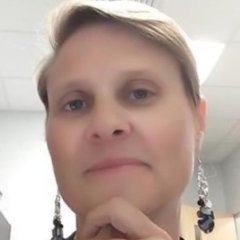Faculty
Karen Atwood
Assistant Professor of Instruction

CONTACT
Sarasota-Manatee campus
Office: SMCB 322
Phone: (941) 359-4392
Email: katwood@usf.edu
| Specialty Area | Recent Publications |
|
Pedagogy and Education, Harmful Algal Blooms Research Key Words: Education, Biology, Marine Science, Marine Biology, Harmful Algal Blooms, Environmental Science |
Karen Atwood |
EDUCATION
Ph.D. Candidate, University of South Florida
M.S., Marine Science, University of South Florida
B.S., Zoology, University of South Florida
TEACHING
Biology 1, Biology 2, Marine & Freshwater Toxins: I enjoy teaching Marine & Freshwater
Toxins because the field trips provide students real world access to scientists and
show students how scientists perform their jobs.
RESEARCH
I have more than 15 years’ experience in harmful algal blooms with FWRI in St. Petersburg,
along with a teaching background in Biology & Environmental Science at UT. I have
a B.S. in Zoology & an M.S. in Marine Science. My thesis was titled Brevetoxin body
burdens in seabirds of Southwest Florida. Harmful algal blooms (HABs, or “red tides”)
of the brevetoxin-producing dinoflagellate Karenia brevis occur periodically along
Florida’s Gulf coast. Mass mortalities of marine birds have long been associated with
these blooms, yet there are few data documenting the accumulation of brevetoxins (PbTx)
in the tissues of birds.
For my thesis, post-mortem evaluations were performed on 185 birds representing 22 species collected from October 2001 through May 2006 during HAB & non-HAB events to quantify body burdens of brevetoxins. A variety of tissues and organs were selected for brevetoxin analysis. Results indicated marine birds are exposed to a range of levels of brevetoxin in their diet during blooms of K. brevis, which may amass in various tissues of the body. As a consequence, the birds may exhibit acute brevetoxicosis during HAB events or show chronic accumulation effects during non-HAB events.
I am currently a doctoral candidate in the College of Education at USF Tampa where I am focusing on accommodations & accessibility for University employees in an effort to support diversity. Many higher education institutions that provide accommodations to students with disabilities (SWDs) fail to meet the needs of faculty, staff, & administrators with disabilities. It is also important to note their needs are often quite different from SWDs. In addition, campus disability offices at most higher education institutions usually only serve the needs of SWDs, with scattered support in different units available to serve employees with disabilities (EWDs), & communication between those units is often lacking or insufficient. Research shows the lack of support & accessibility denied to EWDs negatively influences career trajectories such as tenure, promotion, & future employment.
Many employees avoid revealing disabilities due to perceived stigma, & so they often struggle to gain, or are completely denied, access to many campus locations or accommodations that may help them accomplish their duties. This can lead to the perception of their behavior, including avoidance of social situations such as meetings, conferences, & office celebrations, as disinterest in their colleagues, reticence, apathy, or the notion an employee is not doing their job. While the frequency, experiences, & rights of SWDs in higher education has recently been a popular topic of study, the incidence & experiences of EWDs in higher education has been largely ignored.
No exact figures exist on the incidence of EWDs in higher education because this information is not systematically collected at these institutions, because many may come into a position without a disability, but may develop one over time either chronically or acutely, & because some elect not to disclose their disability due to perceived stigma. Much of the existing research focuses on access and accommodations for SWDs & shows when students have appropriate support, they fare better in college & report better outcomes. However, institutional support for EWDs is lacking.
My doctoral research seeks to understand the perceptions, attitudes, & experiences of faculty, staff, & administrators with disabilities concerning accommodations & accessibility at several large public universities in the southeastern United States. The research will fill a gap in the literature concerning these employees, & identify best practices to contribute to individual agency, & identify potential solutions for higher education institutions. Moreover, understanding & recognizing these experiences can positively affect policy implementation at post-secondary educational institutions to advance employee success & retention.